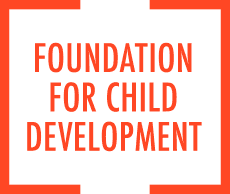The Foundation for Child Development is the oldest private, independent grantmaking foundation in the nation with a sustained focus on improving the well-being and development of children. In its history spanning more than 120 years, the Foundation has contributed to the field of child development by supporting research, policy formation, effective practice, and advocacy.
The Foundation for Child Development started as an Auxiliary Board of the New York City Children’s Aid Society in 1899 and was incorporated as a voluntary agency in 1900. From the start, its mission focused on affirming the public responsibility for the education of children. Leading the Auxiliary Board, Mabel Irving Jones, a concerned citizen and advocate, and her colleagues worked in the early 20th century to ensure access to formal education for children with physical disabilities, many of whom were homebound. By 1904, nearly 120 school-aged children with disabilities were attending school outside of the home. In 1906, Public School 104 of the New York City Board of Education operated the first public school class for children with physical disabilities.
In 1908, the Auxiliary Board was established as the Association for the Aid of Crippled Children (AACC) separate from the Children’s Aid Society to teach and aid children with disabilities, including victims of polio. The AACC was supported entirely by public contributions and employed trained nurses to oversee school nurse and health services. In addition to providing braces and other therapeutic devices and transportation to school and health clinics, the AACC also established physical rehabilitation facilities. By 1940, over 30,000 children benefited from these services. In 1913, the Foundation’s mission of utilizing research to inform policy and practice was cemented through supporting large-scale survey studies of city neighborhoods (Cherry Hill and Yorkville), children’s health needs, and access to services.
In 1944, the AACC received a bequest from the Estate of Milo M. Belding, a silk manufacturer and banker whose donation honored his spouse, Annie K. Belding, a devoted volunteer and association board member for over 20 years. This bequest allowed the AACC to become a grantmaking organization. Although the AACC initially continued to provide direct services to children, in 1950 the Visiting Nurse Service of New York assumed this aspect of the agency’s services. The Association also expanded its purview to include children with other developmental disabilities and disorders during this period.
In 1962, the organization made its first significant investments in supporting scholarship and developing new research fields by establishing the Belding Scholars to support senior scholars conducting multi-disciplinary research on child development. In 1981, the Foundation established the Young Scholars Program (YSP) to support the emerging field of developmental psychology focusing on child well-being, as well as young children’s cognitive, social, and emotional development. In 2003, the Foundation re-established YSP to support a new generation of scholars and their research on the development, early education, and health needs of young immigrant or newcomer children. Today, YSP continues with a focus on examining the knowledge, skills, and dispositions of the early care and education workforce to enhance young children’s growth and development across the birth-through-age-eight continuum.
The Foundation developed several new program areas that linked research to policy, practice, and leadership development. During the mid-1970s grants also focused upon methods that would transfer knowledge from scholarly endeavor to government policymakers. For example, in 1974, in partnership with the William T. Grant Foundation, the Foundation established Congressional Science Fellowships through the Society for Research in Child Development. These fellowships provided individuals with the opportunity to learn about and contribute to the national legislative process with the goal of translating child development knowledge into public policymaking.
In the 1980s – 1990s, the Foundation built partnerships with organizations to focus on societal interventions supporting children from low-income families in New York. Much of the work focused on creating a two-generation perspective in intervention policies addressing family income insecurity, helping families to attain self-sufficiency through work, and reforming child welfare policy and practice. In addition, the Foundation continued the case study, neighborhood approach to identify effective practice strategies that would improve children’s lives by supporting the Center for Family Life in Sunset Park, Brooklyn.
In the 2000s, the Foundation continued working at the intersection of research, policy, and practice by building and shaping the prekindergarten to third grade initiative which aimed to create strong connections between learning experiences across these critical years. The PreK-3rd approach requires strong alignment of educational standards, curricula, assessment, instruction, and professional development, as evidenced by many of the case studies that the Foundation supported to highlight effective models.
Throughout its history, the Foundation has nurtured groundbreaking work in diverse areas of child development – physical, cognitive, social, and emotional well-being. It has been a leader in understanding children’s disabilities, prevention, and parenting. It has shaped developmental theories, PreK-3rd grade systems, and policy and programmatic strategies to support young children and their families. It has long seen investing in scholars as a way to build emerging, needed research evidence and to develop future leaders.
As we approach the final year of the Foundation’s 10-year initiative focused on strengthening and supporting the capacity and status of the early care and education workforce, we are reflecting on insights gained from our efforts to ensure that young children receive high-quality care and education from birth through age eight. These reflections inform our ongoing and future endeavors.
Today, the Foundation’s commitment to children and their families endures, accompanied by our commitment to integrating research, policy, and practice to improve the lives of young children. Learn more about the Foundation’s current exploration into pursuing social justice for young children marginalized by racism, xenophobia, and economic inequality.
For an in-depth journey through our history, read 100 Years of Commitment to Children: Change and Continuity, as well as Our Basic Dream. The Foundation’s archives from 1909 through 2000 can be accessed electronically at Rockefeller Archive Center.

